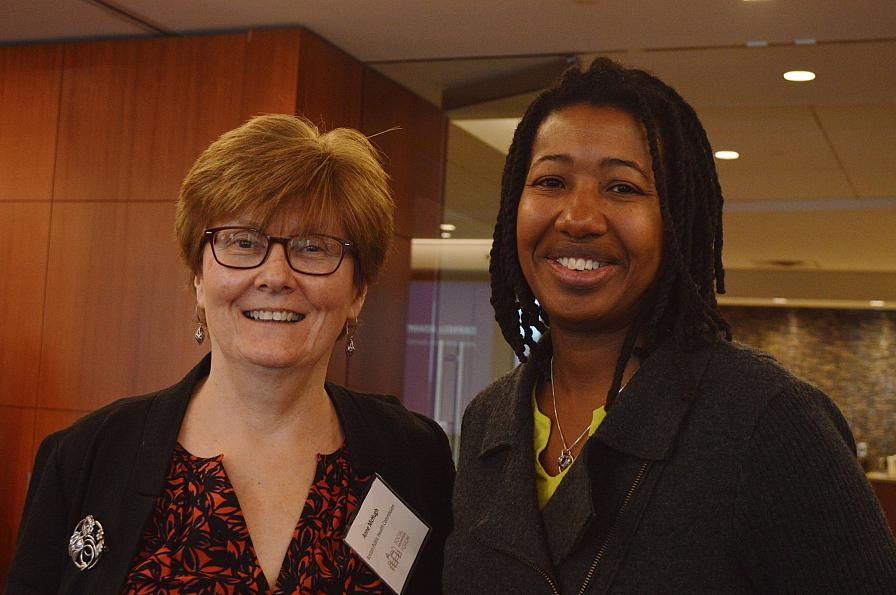
Aditi Giri
Anne McHugh of BPHC and Darnell Adams of Dorchester Food Co-op at the Finding Community-Based Solutions to Food Insecurity Social Issue Talk
Congratulations to our 2026 Social Innovators!

Aditi Giri
Anne McHugh of BPHC and Darnell Adams of Dorchester Food Co-op at the Finding Community-Based Solutions to Food Insecurity Social Issue Talk
During the month of March, the Social Innovation Forum is hosting eight "Social Issue Talks" across the city. This year, we've invited guest bloggers from our community to offer their perspective on the events and reflect on what they learned about the social issues facing greater Boston. Guest blogger Julia Satti Cosentino, a Trusts and Estates partner and co-chair of Nutter Charitable Advisors at Nutter McClennen & Fish, gives her take on "Finding Community-Based Solutions to Food Insecurity," held on March 15.
Last week I had the pleasure of hosting a "Social Issue Talk" convened by the Social Innovation Forum (SIF) on finding community-based solutions to food insecurity. I was happy to see a strong turnout, despite the attendees having to brave a chilly, sometimes sideways, rain to travel to Nutter's conference center for the event.
I always look forward to SIF events. They never fail to open my eyes to new change makers in and around Boston who are attacking the problems my clients care very much about solving. My own table at the event evidenced how broad the SIF community has become. I found myself sitting next to a leader from a local nonprofit and across from leaders from a family foundation, a wealth management company, and a corporate foundation. It is affirming to know how many of us are pitching in to find the solutions.
I always look forward to SIF events. They never fail to open my eyes to new change makers in and around Boston who are attacking the problems my clients care very much about solving.
We had the privilege of hearing from the keynote speaker, Anne McHugh, who is Director of the Chronic Disease Division at Boston Public Health Commission, as well as the SIF Innovator, Darnell Adams, from the Dorchester Community Food Co-op. Anne explained to us how pervasive food insecurity is in our community and the various ways that poverty inserts itself into matters of nutrition and hunger. She shared statistics that were nothing short of a call to action. Anne told of the creative ideas that are being brought to bear on the problem, such as Boston Bounty Bucks, which incentivizes SNAP recipients to utilize farmers' markets which, in turn, supports and stabilizes farmers' markets in low-income neighborhoods by increasing the residents' buying power.
The “holy grail,” we learned, is an innovative community solution that can link food availability to community empowerment, a healthier food system, and economic and racial justice. Darnell is a "food entrepreneur" who is taking all of her expertise and passion and pouring them into building the Dorchester Community Food Co-op, which promises to be one such innovative solution. Darnell described how this community and worker-owned cooperative market intends to offer healthy, affordable food to its customers while it provides sustainable economic opportunity for its employees. My impression is that Darnell and her colleagues are working around the clock, in all corners of the diverse community that is Dorchester and beyond, to recruit members and reach out to investors in various ways, including through a direct public offering that is closing on June 28. The Co-op intends to open the doors of its market within the next two years. There is no doubt – if the Co-op team can garner the funding – this will be a grand opening that all of Boston can celebrate.
About the Author
Julia Satti Cosentino is a Trusts and Estates partner and co-chair of Nutter Charitable Advisors. She is experienced in complex estate and tax planning, probate and trust administration, and in advising philanthropists on all aspects of charitable giving. She focuses on counseling family foundations on organizational structure, grantmaking, impact investing, compliance, and strategic planning. Julia serves as trustee or director of a number of private trusts and foundations.